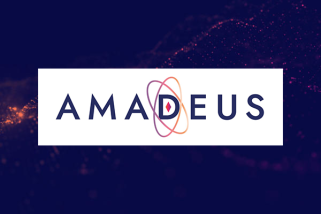
Quantum Technology training for policymakers - 2nd training series
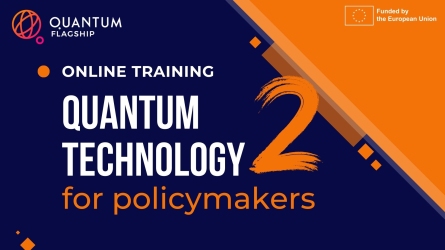
The Quantum Flagship is offering a series of training sessions on Quantum Technology (QT), addressing policymakers at EU and national levels. The training has been designed in collaboration with EC policymakers accounting for their interests and needs.
The second training series consist of monthly online sessions from September 2024 to June 2025, each 60 minutes long with 30 minutes of presentations from experts and a 30-minute Q&A session. The sessions were be recorded and made available on this page.
The training sessions will cover:
Click on the links below to be directed to the sessions and find more information.
- Societal Challenges of QT in Europe (September 2024)
- Unlocking Quantum Innovation: Opportunities for Companies and Research in Europe (October 2024)
- Use Cases of Quantum Sensors: Gravimetry, Navigation, Mine clearance (November 2024)
- Efforts and investments in QT beyond EU (January 2025)
- EU and national public strategies for QT (March 2025)
- Commercialisation and socio economic impact of QT (April 2025)
- Vision for integrating QT and AI (May 2025)
- Chips Act for QT (June 2025)
Contacts persons:
Oxana Mishina (CNR-INO) oxana.mishina@ino.cnr.it
Costanza Toninelli (CNR-INO) costanza.toninelli@ino.cnr.it

About the moderator:
Dr. Oxana Mishina obtained her PhD in physics from St. Petersburg Polytechnic University. She conducted quantum experiment simulations at both the Niels Bohr Institute and the Kastler-Brossel Laboratory. Her contributions also extend to developing a theory for cooling and squeezing atoms at Saarland University. In her role as a physics education researcher at TU Braunschweig, she engaged in collaborative work with the University of Trieste, focusing on in-service teacher training in the field of quantum physics.
Oxana works as the Italian National Institute of Optics of the National Research Council CNR-INO within the Coordination and Support Action of the European Quantum Flagship. She contributes to the areas of education and equity, diversity and inclusion (EDI) in the European Quantum Technology community by creating and coordinating the QTEdu.eu community (>400 members), organising the Quantum Technology training for policymakers, coordinating the Equity&Inclusion working group at QTEdu.eu (>100 members) and being a member of the EDI WG since 2018. Oxana is also an experienced science communicator, having been a Quantum Ambassador in schools since 2015 and having organised and participated in numerous outreach events in France, Germany and Italy, such as the Italian Quantum Weeks, which developed 20 Italian cities.
1st session: Societal Challenges of QT in Europe
with Dr. Marcela Linkova, Head of Centre for Gender and Science at Czech Academy of Sciences
and Prof. Pieter Vermaas, Professor in Philosophy of Design and Quantum Technologies and Ethics Research Lead at Quantum Delta NL
moderated by Dr. Oxana Mishina, Quantum Physicist at National Institute of Optics CNR-INO
26 September 2024
11:00 CET - 12 :00 CET
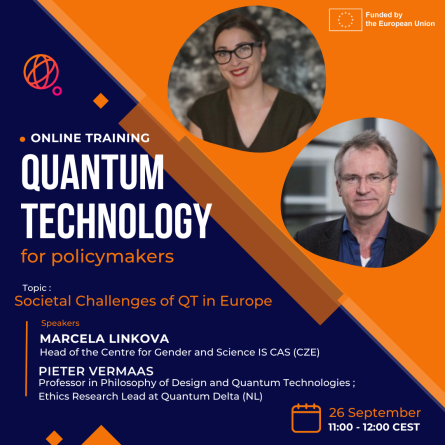
Agenda
- Welcome to the second training series by Oxana Mishina
- Strategies towards gender balance and latest news from GENDERACTIONplus CSA by Dr. Marcela Linkova
- Addressing the Societal Challenges of QT Innovation - Vision Paper 2024 by Prof. Pieter Vermaas
- Q&A session
About the speakers:
Dr. Marcela Linkova is the Head of the Centre for Gender and Science at the Institute of Sociology of the Czech Academy of Sciences. She holds a PhD in Sociology from Charles University, Prague. Her research focuses on the sociology of gendered organisations and institutional change, gender-based violence in academia, the governance of research, and public policies for gender equality in R&I. Marcela is the Member State Co-Chair of the ERA Forum Subgroup on Inclusive Gender Equality; she coordinates the Horizon Europe project GENDERACTIONplus and has participated in multiple Horizon 2020 gender equality projects.
Prof. Pieter Vermaas is an Associate Professor in the Ethics and Philosophy of Technology Department at Delft University of Technology. At Delft University, Pieter Vermaas contributed to the creation of the Dual Nature of Technical Artifacts research program (2000–2005), which analysed technical artefacts as having both structural and intentional natures, with functions playing a crucial role in relating these natures. From 2006 to 2010, he conducted research under an NWO VIDI fellowship on the use of functions and functional decompositions in engineering design methods. In 2017, he helped establish the Delft Design for Values Institute, which aims to incorporate moral, societal, and legal values into technology through design. His current research focuses on design and quantum technologies, specifically exploring how societal aims can be realised through design in accordance with codes of ethics.
2nd session: Unlocking Quantum Innovation: Opportunities for Companies and Research in Europe
with Weronika Słomińska, Business Developer at TNO (Netherlands)
and Johanna Anteroinen, Senior Project Manager at VTT (Finland)
moderated by Dr. Oxana Mishina, Quantum Physicist at National Institute of Optics CNR-INO (Italy)
24 October 2024
11:00 CET - 12 :00 CET
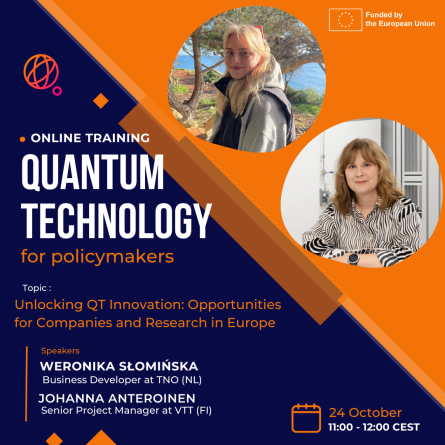
Agenda
- Introduction to the training by Oxana Mishina (CNR, IT)
- Key findings of the industry needs analysis, conducted by the European Quantum Industry Consortium and presented by Johanna Anteroinen (VTT, FL)
- Presentation of the Qu-Test and QU-Pilot initiatives, highlighting business opportunities by Weronika Słomińska (TNO, NL)
- Q&A session
About the speakers:
Johanna Anteroinen is a Senior Project Manager in the Microelectronics and Quantum Technologies research area at VTT in Finland. At VTT, she manages the co-development project of Finland’s first three quantum computers and participates in the Quantum Flagship CSA, QUCATS. Prior to joining VTT, she worked in various industries, most recently in ALD and innovation consulting. She holds a licentiate degree in micro- and nanoelectronic circuit design from Aalto University.
Weronika Słomińska is a Business Developer for Quantum and Semicon at TNO (the Netherlands Organisation for Applied Scientific Research), where she explores ways to support the Dutch and European quantum ecosystem, including through European initiatives such as the Qu-Test and Qu-Pilot projects. She also has experience analysing the private investment landscape in the quantum market, helping to connect promising European startups with investors.
3rd session: Use Cases of Quantum Sensors: Gravimetry, Navigation and Mine Clearance
with Prof. Philippe Bouyer, Professor at UvA, TU/e (Netherlands), Founder of Muquans (now Exail, France), Quantum Delta chair of the board (Netherlands)
and Prof. Guglielmo Maria Tino, Professor at University of Florence, group leader at LENS, CNR-INO, INFN, founder of AtomSensors s.r.l. (Italy)
moderated by Dr. Oxana Mishina, Quantum Physicist at National Institute of Optics CNR-INO (Italy)
28 November 2024
11:00 CET - 12 :00 CET

Agenda
- Introduction to the training by Oxana Mishina (CNR, IT)
- Use cases for quantum sensors presented by Prof. Philippe Bouyer (UvA, TU/e, NL)
- Use cases for quantum sensors presented by Prof. Guglielmo Maria Tino (UNIFI, IT)
- Q&A session
About the speakers:
Philippe Bouyer is a CNRS research director on secondment, a professor at the University of Amsterdam and the Eindhoven University of Technology, and a specialist in laser-cooled atoms. After completing his PhD at the Kastler-Brossel laboratory in Paris, he moved to Stanford University and then to the Institut d'Optique where, among other things, he carried out the first experiments on matter-wave quantum sensors and quantum simulators. Founder of the Photonique, Numérique et Nanosciences laboratory and of the Muquans start-up in Bordeaux, he is now in charge of science and technology for the national Quantum Delta NL initiative.
Guglielmo Maria Tino is a Full Professor of Physics of Matter at the University of Florence, where he leads a research group at the Department of Physics, LENS Laboratory, CNR-INO, INFN. He graduated in Physics from Università di Napoli "Federico II" and received his PhD from Scuola Normale Superiore di Pisa. He was a researcher and Associate Professor at the University of Naples before moving to Florence in 2001. He spent extended research periods abroad at JILA and NIST in Boulder-Colorado and at the Ecole Normale Superieure in Paris. Tino has secured funding as a national and international PI for projects from EC, ESA, MIUR, INFN, ENI, and others. In 2015, he founded AtomSensors s.r.l., a University of Florence spin-off. He is also the inventor of three patents in sensor technology, contributing to both academic research and industrial applications.
4th session: Efforts and Investments in Quantum Technology Beyond Europe
with Louise Turner, CEO of the Quantum Algorithms Institute in British Columbia (Canada)
and Joe Spencer, Key Account Manager at Global Quantum Intelligence, LLC (UK)
moderated by Dr. Oxana Mishina, Quantum Physicist at National Institute of Optics CNR-INO (Italy)
30 January 2025
16:00 CET - 17:00 CET

Agenda
- Introduction to the training by Oxana Mishina (CNR, IT)
- Canadian Quantum Technology's current efforts and investments by Louise Turner
- UK quantum ecosystem assessment by Joe Spencer
- Q&A
About the speakers:
Louise Turner is the CEO of the Quantum Algorithms Institute in British Columbia, Canada. QAI supports the growth of jobs and companies in BC’s burgeoning quantum computing sector. Louise is an expert in economic development, focusing on creating the right conditions for the adoption of technology and innovation.
Louise began her career as a fast-track civil servant in the British government and has worked in high-tech start-ups and accelerators. She has led technology mergers and acquisitions, as well as several initiatives in health innovation in Canada.
Louise previously served as President of the Premier’s Technology Council in British Columbia, providing insight into the needs of growing tech companies for the BC government. Support for early technology development and adoption occurs at the intersection of government, academia, and industry, and Louise is uniquely equipped to take on this role.
She holds an MBA from Cranfield School of Management in the UK and is also an executive coach, board advisor, and angel investor.
Joe Spencer is a Quantum Technology Specialist and business leader with a diverse career at the forefront of quantum innovation. He is currently the Quantum Business Affairs Lead for the European Quantum Industry Consortium (QuIC) and a Key Account Manager at Global Quantum Intelligence, LLC, where he helps drive quantum advancements globally with a trusted and authoritative approach. He also serves as Director of IoniQ Consulting, providing technical consultancy for defence projects and fostering early career talent through tailored industry placements.
5th session: EU and national public strategies for QT
with Marina Natalucci, Research Director of Quantum Computing & Communication Observatory at Politecnico di Milano (Italy)
and Elżbieta Hryniewicka, Chief International Specialist at the National Science Centre Poland (Poland)
moderated by Dr. Oxana Mishina, Quantum Physicist at National Institute of Optics CNR-INO (Italy)
27 March 2025
11:00 CET - 12:00 CET
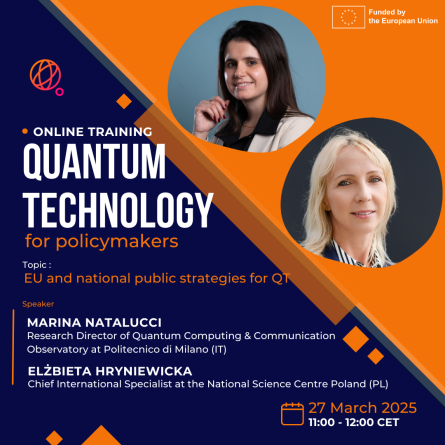
Agenda
- Introduction to the training by Oxana Mishina (CNR, IT)
- European national strategies by Marina Natalucci
- QuantERA mapping of national, regional & European public policies in Quantum Technologies by Elżbieta Hryniewicka
- Q&A
About the speakers:
Marina Natalucci is a Management Engineer and, since 2016, has been working in the Digital Innovation Observatories at the Politecnico di Milano, conducting research in the fields of cloud computing, computing infrastructures, and software.
She is currently the Research Director of the Data Centre, Quantum Computing & Communication, and Software & Digital Native Innovation Observatories at the School of Management, Politecnico di Milano.
Elżbieta Hryniewicka is a Chief International Specialist at the National Science Centre Poland (NCN), responsible for the operational management of the QuantERA Programme – a pan-European funding initiative dedicated to advancing Quantum Technologies. She also coordinates the upcoming third edition of the programme.
Her experience includes analysing policies and funding schemes in selected countries outside Europe, helping to explore promising collaboration opportunities for the continent (contributing to the Quantum Flagship CSA, InCoQFlag project). Prior to joining NCN, she gained experience across various industries, managing multiple EU-funded R&D projects.
6th session: Commercialisation and socio economic impact of QT
with Emily Meads, Principal at Quantonation (France)
and Mattia Giardini, Project and Operations Manager at European Quantum Industry Consortium - QuIC, (Germany)
moderated by Dr. Oxana Mishina, Quantum Physicist at National Institute of Optics CNR-INO (Italy)
24 April 2025
11:00 CET - 12:00 CET
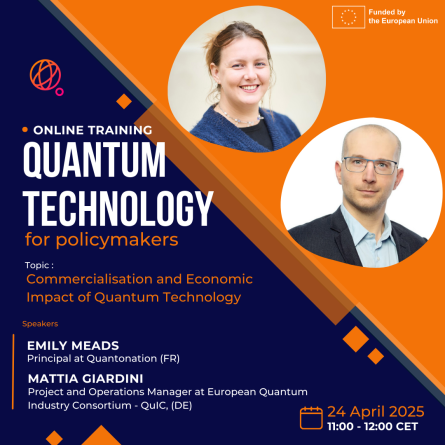
Agenda
- Introduction to the training by Oxana Mishina (CNR, IT)
- Insights from a venture capital by Emily Meads
- Recommendations from QuIC by Mattia Giardini
- Q&A
About the speakers:
Emily Meads is a physicist by training, holding a bachelor’s degree and two master’s degrees in physics from the University of Bath and the Universidad Politécnica de Madrid. Aware that key enabling technologies can sometimes remain hidden behind academic walls, she is most excited by helping founders bring their innovations out of the lab and into the real world. Having spent several years investing in deep tech at Speedinvest, she believes that technical breakthroughs drive the greatest disruption and innovation. Physics-based technologies, in particular, have always held a special place in both her heart and professional pursuits.
Mattia Giardini is the QuIC Project Manager. He previously coordinated several quantum technologies projects for the universities of Ulm, Kassel, and Berlin. He holds a master’s degree in International Relations from the University of Padua.
7th session: Vision for integrating QT and AI
with Prof. Sabrina Maniscalco, Professor of Quantum Information and Computing at the University of Helsinki, CEO and co-founder of Algorithmiq (Finland)
and Prof. Philipp Slusallek, scientific director at the German Research Center for Artificial Intelligence (DFKI), Professor at Saarland University (Germany)
moderated by Dr. Oxana Mishina, Quantum Physicist at National Institute of Optics CNR-INO (Italy)
22 May 2025
11:00 CET - 12:00 CET

Agenda
- Introduction to the training by Oxana Mishina (CNR, IT)
- Presentation by Prof. Sabrina Maniscalco
- Presentation by Prof. Philipp Slusallek
- Q&A
About the speakers:
Sabrina Maniscalco is the CEO and co-founder of Algorithmiq Ltd, a startup focused on quantum algorithms and software. She is also Professor of Quantum Information and Logic at the University of Helsinki, and Adjunct Professor at Aalto University, Finland.
She serves as Vice Director of the Finnish Centre of Excellence for Quantum Technologies and is a member of the scientific advisory boards of several international institutions.
Sabrina Maniscalco has worked in quantum science and technology for over twenty years, with particular expertise in the effects of noise and errors on quantum devices. She has published more than 250 peer-reviewed scientific papers in international journals, which have collectively received over 10,000 citations. She has coordinated several international and interdisciplinary projects and is widely recognised as one of the leading experts in quantum technologies.
She currently focuses primarily on her work at Algorithmiq, where she leads a team with the ambitious mission of redefining healthcare and life sciences by integrating quantum computing, complex network theory, and artificial intelligence.
Philipp Slusallek is Scientific Director and member of the Executive Board at the German Research Center for Artificial Intelligence (DFKI), where he leads the research area on Agents and Simulated Reality. Since 2018, he has been co-founder and Director of Strategy of the European AI initiative CAIRNE.
At Saarland University, he has held the Chair of Computer Graphics since 1999. He was a Principal Investigator at the German Excellence Cluster Multimodal Computing and Interaction from 2007 to 2019, and co-founder and Director for Research at the Intel Visual Computing Institute from 2009 to 2017. Prior to joining Saarland University, he was a Visiting Assistant Professor at Stanford University.
Professor Slusallek is a member of acatech (the German National Academy of Science and Engineering), a Fellow of Eurographics, and previously served as a member of the High-Level Expert Group on Artificial Intelligence for the European Commission. He was also an Associate Editor for Computer Graphics Forum.
He originally studied physics in Frankfurt and Tübingen (Diploma/MSc), and received his PhD in Computer Science from Erlangen University. His research spans a wide range of topics including artificial intelligence in a broad sense, simulated/digital reality, real-time and realistic graphics, high-performance computing and simulation, motion models and synthesis, novel programming models for CPU/GPU/FPGA, computational science, and more.
8th session: Chips Act for QT
with:
Christian Trefzger, Policy officer - Quantum Technologies, DG CNECT, European Commission (Belgium),
Andreas Tortschanoff, Principal Scientist at Silicon Austria Labs (Austria)
Nicole Fabbri, Senior Researcher at National Institute of Optics (CNR-INO) and European Laboratory for Nonlinear Spectroscopy (LENS) (Italy),
Pepijn Pinkse, Professor at University of Twente (Netherlands),
Kristiaan De Greve, Programme Director Quantum Computing at Imec, Professor of Electrical Engineering and Proximus Chair in Quantum Science and Technology at KU Leuven (Belgium),
Alexandra Paul, Global Public Policy Lead at Pasqual (France)
Pekka Pursula, Director of Microelectronics and Quantum Research at VTT - Technical Research Centre of Finland, Ltd. (Finland)
moderated by Dr. Oxana Mishina, Quantum Physicist at National Institute of Optics CNR-INO (Italy)
26 June 2025
11:00 CET - 12:00 CET
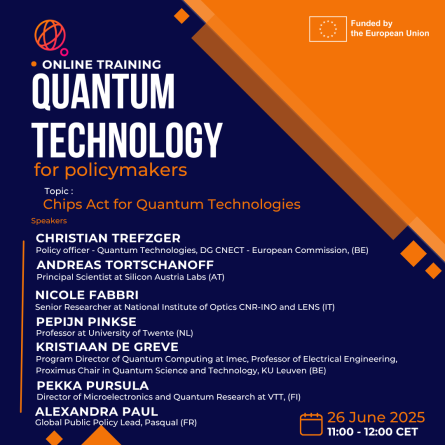
Agenda
- Introduction by Christian Trefzger, European Commission
- Trapped-ion pilot line CHAMP-ION by Andreas Tortschanoff
- Diamonds pilot line DIREQT by Nicole Fabbri
- Photonic pilot line P4Q by Pepijn Pinkse
- Semiconducting pilot line SPINS by Kristiaan De Greve
- Neutral atom pilot line Q-PLANET by Alexandra Paul
- Superconducting pilot line SUPREME by Pekka Pursula
- Q&A
About the speakers:
Dr Christian Trefzger is a physicist specialising in quantum physics. He earned his PhD from the Institute of Photonic Sciences in Barcelona, where he focused on quantum memories. He later conducted research on polarons and superconductivity at the École Normale Supérieure in Paris. He now serves as a Policy Officer in the Quantum Technology unit at the European Commission’s DG CNECT.
Dr Andreas Tortschanoff obtained his PhD in Physical Chemistry from the University of Vienna in 1999. He began his professional career as a scientific employee within the ADLIS special research project on advanced light sources, and subsequently at the Laboratory of Ultrafast Spectroscopy at EPFL between 2003 and 2008. From 2008 to 2019, Dr Tortschanoff was a Senior Researcher at Carinthian Tech Research AG (CTR) in the field of optical system design. Since 2019, he has held the position of Principal Scientist in the Photonic Systems research unit at Silicon Austria Labs. His main interests there are in the fields of integrated photonics and quantum technologies.
Dr Pekka Pursula received his Doctor of Science in Physics from Aalto University, Helsinki, Finland, in 2009. He has held several positions at VTT Technical Research Centre of Finland, where he is currently Director of Microelectronics and Quantum Research. Dr Pursula is responsible for leading research in quantum technology, and he oversees the Finnish quantum computer development programme at VTT. He is actively involved in shaping national and European research agendas. In 2023, he led the European Quantum Flagship Strategic Research and Industry Agenda for the chapter on quantum sensing and metrology. He was also a member of the national committee responsible for formulating the Finnish national strategy in quantum technologies for the years 2024 and 2025.


